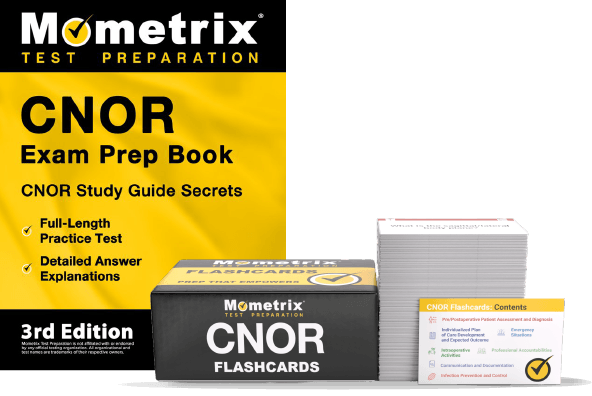Welcome to this review of the CNOR exam!
If you need help studying for the CNOR test or just want some more information about what the test is like, you’ve come to the right place!
What’s on the CNOR Exam?
Online CNOR Prep Course
How to Register
How the CNOR Exam is Scored
Retaking the Exam
FAQs
Test Eligibility
Before you can register to take the CNOR test, there are a handful of things you’ll need to take care of.
- You must have an RN license in the US that is current and unrestricted.
- You must currently be working either full-time or part-time in the perioperative nursing field.
- You must have a minimum of 2 years and 2,400 hours of perioperative RN experience.
Once you’re sure you’ve racked up the necessary experience hours and that your RN license is valid, you can begin the registration process.

What’s on the CNOR Exam?
First, let’s talk about the questions on the CNOR test. There are 200 questions total, but only 185 of the questions will count toward your final score. Why is that?
The 15 unscored questions on the CNOR test are called “pre-test” questions. These questions are added to the test to determine if they’re good questions to add to future versions of the test.
The trick is that you won’t have any way of knowing which questions are scored and which ones are pretest questions. They will appear just like the other questions throughout the test.
The time limit for the CNOR test is 3 hours and 45 minutes. There aren’t any scheduled breaks, but you’re free to take restroom breaks as needed.
Let’s take a closer look at the different sections of the CNOR test:
1. PRE/POSTOPERATIVE PATIENT ASSESSMENT AND DIAGNOSIS
28 scored questions
- Use two patient identifiers to confirm patient identity
- Confirm correct operative site, procedure, and site marking
- Assess patient data
- Use health assessment techniques that are culturally appropriate and age-appropriate
- Review the reconciliation of medication
- Conduct an individualized psychosocial and physical assessment
- Obtain a focused assessment that is relevant to the procedure at hand
- Perform a pain assessment
- Identify nursing diagnoses
- Confirm DNR status and/or advanced directive status
- Ensure appropriate patient and family teaching that relates to the procedure at hand
2. INDIVIDUALIZED PLAN OF CARE DEVELOPMENT AND EXPECTED OUTCOME IDENTIFICATION
15 scored questions
- Identify measurable patient outcomes
- Identify specific interventions for each diagnosis
- Address specific patient considerations in the care plan
- Evaluate the patient’s responses to the care plan
- Update the care plan as needed
- Facilitate patient care using critical thinking skills
3. MANAGEMENT OF INTRAOPERATIVE ACTIVITIES
63 scored questions
- Monitor environmental hazards
- Optimize behavioral responses to the surgical procedure
- Prepare the surgical site
- Select appropriate protective barrier materials
- Evaluate the patient’s response to pharmacological agents
- Manage anesthesia
- Control various environmental factors
- Use aseptic technique to maintain a sterile field
- Wield tools appropriately
- Maintain the patient’s privacy and dignity
- Advocate for the patient’s rights
- Prepare, label, and transport specimens correctly
- Ensure that the correct implants are available and prepared
- Prepare explants for final disposition
- Ensure solutions, medication containers, and medications are labeled
- Perform appropriate surgical counts
- Perform universal protocol
- Anticipate the need for intraoperative blood transfusion
- Use proper body mechanics
- Perform proper patient positioning
- Intervene with disruptive or impaired behavior in patients and family members
- Identify various wound classifications
- Maintain wound dressings
- Acquire the necessary equipment and supplies
- Review the expiration date of products
- Implement cost-containment measures
- Evaluate and select products
- Supervise and educate healthcare team members
- Delegate tasks to personnel
- Supervise visitors
- Manage any HCIR presence in the operating room
- Uphold environmental stewardship
4. COMMUNICATION AND DOCUMENTATION
20 scored questions
- Maintain accurate patient records
- Collaborate with the interdisciplinary healthcare team
- Communicate the patient’s current status
- Communicate measurable patient outcomes
- Document the perioperative education that has been provided to the patient
- Document follow-up communication post-discharge
- Document both preoperative and postoperative assessments
- Document the transfer of care
- Document the measures taken to prepare and track various trackable items
- Evaluate the patient’s status
- Implement effective solutions to identified patient communication barriers
- Provide HIPAA-supported information about the patient
- Read back for verbal orders
- Document various surgical wound classifications
5. INFECTION PREVENTION AND CONTROL OF ENVIRONMENT, INSTRUMENTATION, AND SUPPLIES
20 scored questions
- Clean the environment properly
- Use appropriate cleaning methods for instruments and reusable goods
- Transport and store single-use items appropriately
- Document sterilization and disinfection
- Handle and dispose of hazardous and biohazardous materials properly
- Utilize PPE
- Adhere to the appropriate sterilization and monitoring procedures
- Monitor storage area conditions and sterilization
- Track outside instruments and materials
- Wear proper surgical attire
- Adhere to proper hand hygiene guidelines
6. EMERGENCY SITUATIONS
18 scored questions
- Identify urgent/emergency situations
- Perform interventions for the following:
- Malignant hyperthermia
- Anaphylaxis
- Cardiac arrest
- Trauma
- Hemorrhage
- Local anesthetic systemic toxicity
- Function as an interdisciplinary team member
- Safeguard patients and healthcare team members from environmental hazards
7. PROFESSIONAL ACCOUNTABILITIES
11 scored questions
- Function with Scope of Practice
- Seek assistance for personal limitations
- Report disruptive behavior
- Uphold ethical and professional standards
- Utilize professional growth resources and tools
- Participate in activities for the improvement of quality
- Participate in interdisciplinary team activities
- Participate in professional organization activities
Online CNOR Prep Course
If you want to be fully prepared, Mometrix offers an online CNOR Prep Course. The course is designed to provide you with any and every resource you might want while studying. The Certified Perioperative Nurse Course includes:
- Review Lessons Covering All the Topics
- 1,200+ CNOR Practice Questions
- More than 500 Electronic Flashcards
- Over 20 Instructional Videos
- Money-back Guarantee
- Free Mobile Access
- and More!
The CNOR Prep Course is designed to help any learner get everything they need to prepare for their CNOR exam; click below to check it out.
How to Register
Once you’ve ensured that you meet all of the eligibility requirements, you can register for the exam.
To get started, you’ll need to create an account on the CCI website. Then, you’ll need to fill out an application, which includes filling out your contact info and some information about your RN license.
When you submit the application, you’ll also need to submit the testing fee, which is $445.
How the CNOR Exam is Scored
The CNOR test is scored using a scaled scoring method. Here’s how it works:
The reason your raw score is converted to a scaled score is because everyone that takes the CNOR test is given a slightly different set of questions. Since everyone has a different arrangement of questions, and because some questions are harder than others, converting your raw score to a scaled score ensures a more even playing field.
Retaking the Exam
If you didn’t get a passing score on your first try, that’s okay! You can retake the test at the start of the next exam period. Just know that you will have to pay the full testing fee every time you retake the test.
Something else to keep in mind is that, as mentioned earlier, each administration of the test is different, so you will not be given the same set of questions when you retake the test.
Self-Assessment ModuleFAQs
How difficult is the CNOR exam?
The CNOR exam is considered to be a difficult exam. CCI recommends spending at least 3 months studying prior to taking it.
How many questions are on the CNOR exam?
There are 200 questions on the test, 15 of which are unscored.
How much is the CNOR exam?
The testing fee is $445.



 CNOR Online Course
CNOR Online Course CNOR Study Guide
CNOR Study Guide CNOR Flashcards
CNOR Flashcards
